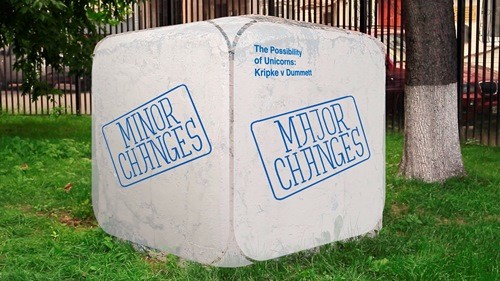
The world’s first monument to peer review could be completed by mid-October. (Courtesy: Igor Chirikov)
By Michael Banks
The Russian sociologist Igor Chirikov from the National Research University Higher School of Economics in Moscow has much to celebrate during this year’s Peer Review Week.
He is now putting in place plans to build what will be the world’s first monument to anonymous peer review and is expecting it to be complete in mid-October.
Earlier this month, Chirikov began a Kickstarter campaign aiming to raise $1300 by 2 October for a sculptor to turn an “ugly” block of concrete outside the university’s Institute of Education into a die. Not any ordinary numbered die, however, but one that would read “accept”, “minor changes”, “major changes”, “revise and resubmit” and “reject” on its five visible sides.
Chirikov, who is also based at the Center for Studies in Higher Education at the University of California, Berkeley, US, told physicsworld.com that the idea came about as he wanted to acknowledge the role of peer reviewers and use it to “have a good laugh about [the] peer reviewer process together with academics”. He adds, “They are absolutely necessary to advance our knowledge though their contribution is not always recognized. At the same time, I feel for researchers. It’s hard to deal with rejection letters and sometimes nasty comments from reviewers.”
Anyone who pledges $1 will get their names on a nearby sign, while those who give $25 or more will get a small model of the monument. Those who stump up $40 or more will receive two models of the monument while $60 or more will get the title of your paper on the monument itself (although there is only space for 20 titles).
Chirikov already exceeded his target just weeks after starting his fundraising campaign and has so far raised $2235 via 109 backers. He says that all the cash raised will be spent and that any extra money will enable them to build it faster and to use more durable – and more expensive – materials.
“I hoped that many academics will like the idea but was a bit surprised how fast we’ve reached the fundraising goal,” Chirikov told physicsworld.com. “It means that there are common challenges in [the] academic profession across the world and disciplines. It also means that scholars have a good sense of humour.”
This week IOP Publishing is playing its part in Peer Review Week 2016 and has announced a raft of new initiatives, including a dedicated website about peer review, a new partnership with Publons – a reviewer recognition service – as well as a trial of double-blind peer review.
Guidelines
Show/hide formatting guidelines
this text was deletedwhere people live in harmony with nature and animals</q>
Some text